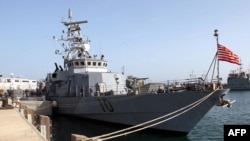A U.S. ship in the North Arabian Sea resorted to firing warnings shots to get three Iranian attack craft to back off following a close encounter in international waters.
The U.S. 5th Fleet issued a statement Tuesday accusing the Iranian Islamic Revolutionary Guard Corps Navy (IRGCN) boats of failing to heed radio warnings and other attempts to hail them, while coming within 62 meters of the USS Firebolt, a navy patrol ship, and the U.S. Coast Guard Cutter Baranoff.
The statement said the two U.S. ships were conducting routine security operations when the armed Iranian boats came “unnecessarily close” and “increased the risk of miscalculation and/or collision” during the encounter late Monday.
After several failed attempts to communicate with the Iranian boats, the crew of the USS Firebolt fired warning shots, at which point the Iranian boats pulled back.
“Throughout the interaction, U.S. forces proactively communicated with the IRGCN vessels and executed pre-planned responses to reduce the risk of miscalculation, avoid a collision, and to de-escalate the situation,” the 5th Fleet statement said.
“The U.S. is not an aggressor,” it said, adding, “Our forces are trained, however, to conduct effective defensive measures when necessary.”
The incident is at least the second this month between U.S. ships and Iranian vessels.
Earlier Tuesday, the U.S. Navy released video of what it described as an “unprofessional interaction” between Iranian boats and U.S. vessels in the Arabian Gulf.
In that incident, according to the U.S., an Iranian naval vessel, accompanied by three fast attack craft, harassed two other U.S. ships, coming within 64 meters, before pulling back.
Despite the concern, the commander of all U.S. forces in the Middle East declined to lay blame for the incidents directly on the Iranian government.
“The activities we typically see from the IRGC Navy are not necessarily activities that are directed by the supreme leader or from the Iranian state,” U.S. Central Command’s General Kenneth “Frank” McKenzie told a virtual audience Tuesday. “Rather [they are] irresponsible actions by local commanders on the scene."
“We're very careful to ensure that we don't get into a provocative cycle as a result of that," McKenzie added. "Luckily, our guys are pretty good … they're very mature and they're able to de-escalate the situation."




